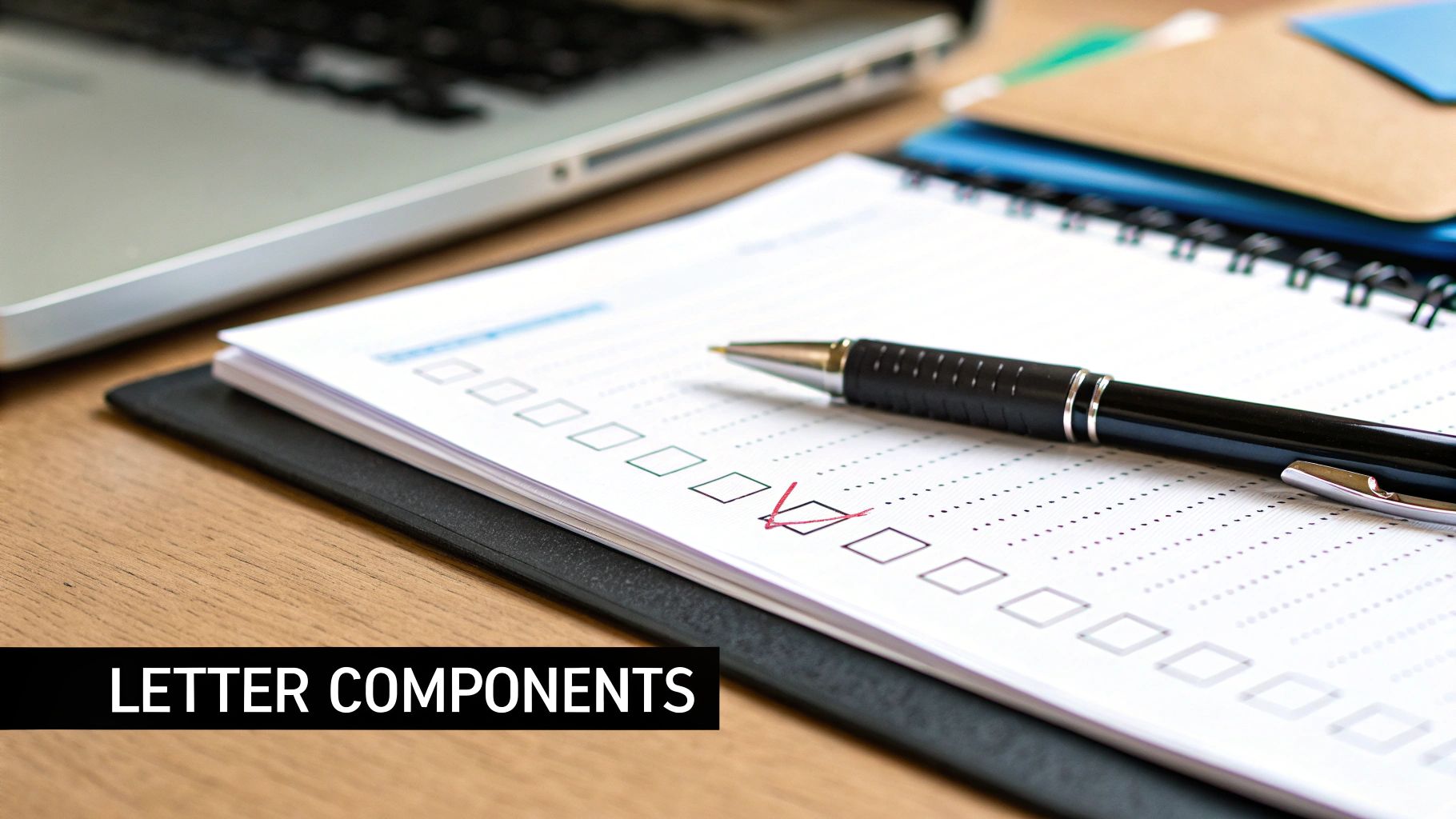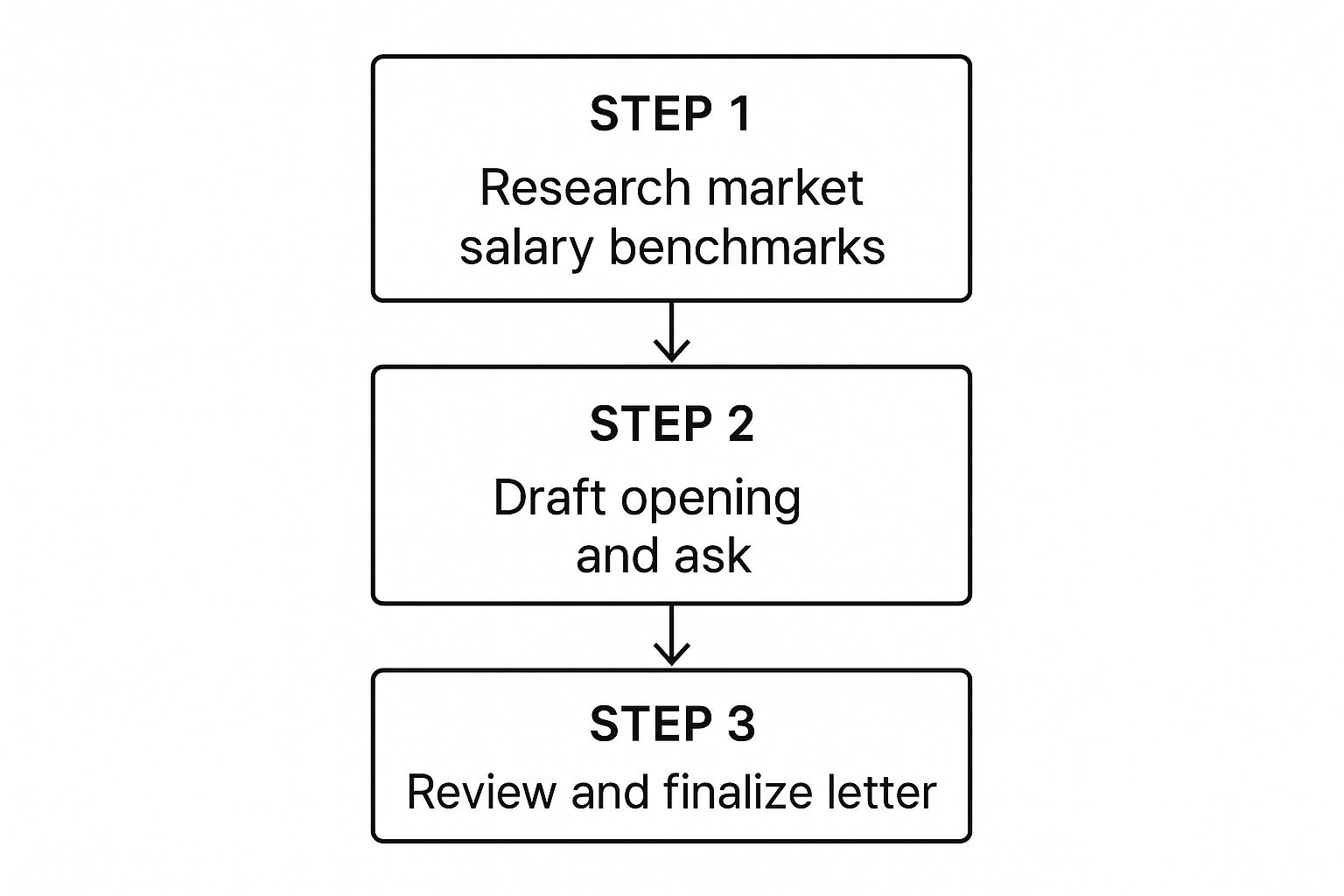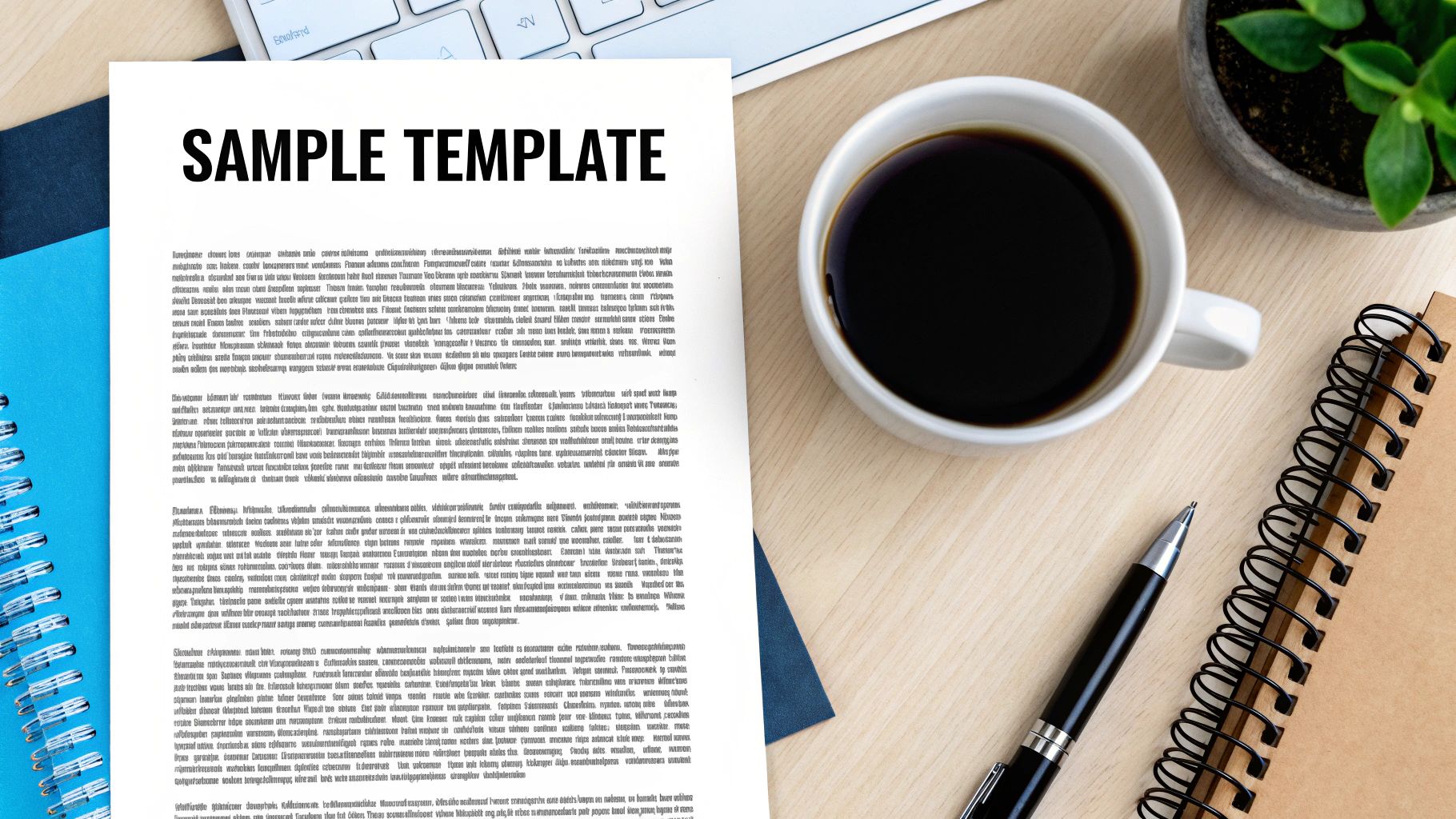When you get a job offer, your first instinct might be to jump on the phone. But a well-crafted salary negotiation letter is often your most powerful tool for getting the compensation you deserve. It lets you build a calm, structured, and data-backed case for your value, turning a simple request into a professional business proposal.
This isn't about avoiding a conversation; it's about starting it on the right foot. A prepared document shows you're serious and gives the hiring manager a clear, shareable argument they can take to the decision-makers.
Why a Negotiation Letter Is Your Strongest Move

Let's face it: talking about money can be awkward. Many professionals worry about sounding too pushy or ungrateful, and that fear often stops them from asking for what they're actually worth. A negotiation letter neatly sidesteps that emotional minefield.
By putting your case in writing, you control the narrative. You can lay out your achievements, market research, and desired salary logically, without being interrupted or getting flustered. It’s not about being confrontational; it’s about bringing clarity and professionalism to the table.
The Power of Preparation and Data
Writing a letter forces you to do your homework, and solid research is the foundation of any successful negotiation. Instead of just pulling a number out of thin air, you’re presenting a thoughtful case built on real evidence. This shows the employer you’re organized, strategic, and invested—all qualities they want in a new hire.
The numbers back this up. Recent studies show that while over half of U.S. candidates (55%) don’t negotiate their pay, those who do see an average salary increase of 18.83% over their initial offer. And with around 66% of negotiators succeeding, the odds are definitely in your favor when you make a well-reasoned ask.
A negotiation letter isn't just a request for more money. It's a professional tool that reinforces your value, sets a collaborative tone, and makes it easier for hiring managers to advocate for you.
Anatomy of a Winning Negotiation Letter
Here’s a quick look at the core components of an effective salary negotiation letter. Use this as a checklist to structure your own.
| Component | What It Achieves | Your Main Goal |
|---|---|---|
| Enthusiasm & Gratitude | Starts the conversation positively and shows you value the offer. | Reiterate your excitement for the role and the company. |
| Your Value Proposition | Connects your specific skills and accomplishments to the job's needs. | Remind them why they offered you the job in the first place. |
| The Data-Backed Ask | Presents your desired salary based on market research and industry standards. | Justify your counteroffer with concrete data, not just personal desire. |
| A Collaborative Close | Proposes next steps and frames the negotiation as a partnership. | Invite a discussion to find a mutually agreeable solution. |
Each part of the letter builds on the last, creating a persuasive and professional argument that is hard to ignore.
Setting a Collaborative Tone
It’s a common myth that negotiating makes you look difficult. In reality, the opposite is true. When done correctly, it shows confidence and a solid understanding of professional norms. A thoughtfully worded letter communicates respect for the hiring manager’s time and the company's process.
Frame the negotiation as a partnership. Use language that shows your excitement for the role and your desire to find a compensation package that works for everyone. This approach is far more effective than a verbal demand, which can feel off-the-cuff and less considered. If you're responding to an initial proposal, looking at some counter offer letter examples can give you great ideas for phrasing that keeps the tone positive.
This simple document can turn a daunting task into an empowering career move.
Laying the Groundwork: Gather Your Evidence Before You Write

A strong salary negotiation letter is never written on a whim. It's the culmination of solid prep work. Before you even think about putting pen to paper (or fingers to keyboard), you need to build a compelling business case for yourself. This turns what could be seen as a simple "ask" into a data-driven proposal they can't ignore.
Your goal here is to arm yourself with undeniable proof of your market value and your direct contributions to the company's bottom line. This evidence becomes the backbone of your negotiation, giving you the confidence to state your worth clearly. Think of it like a lawyer preparing for court—you need facts, figures, and a rock-solid argument.
Figure Out Your Market Value
First things first, you need to anchor your request in reality. What is someone with your exact skills, in your city, with your level of experience typically paid for this kind of role? Flying blind is not an option.
You have to consult reliable, data-backed sources to figure out a credible salary range. Honestly, this research is the most important part of the whole process and will be the most powerful evidence you present.
Here are some of the best places to look for salary data:
- Glassdoor: A goldmine of anonymous, employee-submitted salary data for specific roles at specific companies.
- Levels.fyi: An absolute must for anyone in the tech industry. It offers incredibly detailed compensation breakdowns, including base salary, stock options, and bonuses.
- Payscale: This site lets you generate a personalized salary report based on your unique profile, which can be really helpful.
- Bureau of Labor Statistics (BLS): A fantastic government resource for comprehensive national and regional pay data across hundreds of different jobs.
By checking a few of these sources against each other, you can establish a realistic and, more importantly, a defensible salary target. This number will be the foundation of your formal request when you fill out the salary negotiation letter template later.
Put a Number on Your Achievements
Okay, so you know your market rate. Now you have to prove you deserve to be at the top end of that range. This is where you directly connect your past performance to the future value you'll bring to the company. Vague statements like "I managed social media" or "I improved team efficiency" just aren't going to cut it.
You absolutely have to translate your accomplishments into concrete, measurable results. Numbers are incredibly persuasive because they show a clear return on investment (ROI).
A classic mistake is simply listing your old job duties. The hiring manager already knows the job description; your letter needs to show them how you knocked it out of the park in a way that created real, tangible value.
Let's break down how to reframe your accomplishments to highlight their impact.
Turning Vague Duties into Tangible Wins
| Instead of This (The "What") | Try This (The "So What?") |
|---|---|
| "Managed the company blog." | "Grew organic blog traffic by 45% in six months, which led to a 15% increase in marketing-qualified leads." |
| "Was responsible for customer support." | "Improved customer satisfaction scores from 82% to 94% after implementing a new ticketing system." |
| "Helped with a software launch." | "Played a key role in a software launch that acquired 10,000 new users in its first quarter." |
See the difference? This approach shifts the entire conversation from what you did to the value you created. When you present these specific, quantified achievements in your negotiation letter, you're not just asking for more money—you're proving you've already earned it.
How to Write Each Part of Your Letter
Okay, let's get into the nuts and bolts of writing this letter. A template is great for the basic skeleton, but the real power comes from the words you choose. Every single part of this letter has a specific job to do, and your goal is to walk the hiring manager from "We like this person" to "We need this person."
I've put together a visual to show you the basic workflow. It breaks down how to structure your thoughts and, ultimately, your letter.

Notice how it all starts with research. You absolutely must do your homework before you even think about writing a single word. That prep work is your foundation.
Crafting a Subject Line That Gets Opened
First things first: the subject line. This is your first impression in their inbox, and you need to get it right. It should be professional, dead simple, and easy to spot. No cutesy or demanding language—just clarity.
Put yourself in the hiring manager’s shoes. They’re drowning in emails. A subject line like "Job Offer" or "Question" is generic and easily gets buried. You need to be more specific so they know exactly what the email is about.
Here are a few solid options:
- Following up on the [Job Title] Offer
- Job Offer: [Your Name]
- Question regarding the offer for [Job Title]
These are direct, professional, and searchable. They immediately tell the recipient that your email is important and tied to a specific task on their to-do list.
The Appreciative and Enthusiastic Opening
Always, always start with genuine thanks and enthusiasm. Remember, you're not just negotiating money; you're starting a professional relationship. You want to reinforce that you appreciate the offer and are truly excited about the chance to join their team.
This positive opening is a strategic move. It frames the negotiation not as a battle, but as a conversation to make a good fit even better.
Start with a "yes" before you get to the "but." Affirming your interest in the role makes the conversation about finding a mutually beneficial agreement, not just about money.
For instance, you could open with something like: "Thank you so much for offering me the [Job Title] position. I was so excited to receive the offer, and I’m confident my skills in [Skill 1] and [Skill 2] will be a great asset to your team."
This kind of opener immediately reminds them why they picked you and sets a warm, collaborative tone for what’s to come. To make sure all your communication hits the mark, it doesn’t hurt to brush up on some essential business writing tips that can help you sound clear and professional.
Building Your Case with a Value-Packed Justification
This is the most important part of your letter. It’s where you connect the dots between the value you bring and the salary you're asking for. This isn't about what you need—it’s about what you’re worth based on your skills, your experience, and the current market.
This is where all that research you did comes into play. You need to present your evidence briefly and with confidence.
Here’s what you should include:
- Reiterate Key Accomplishments: Briefly remind them of a specific win you discussed during the interview. Something like, "During my interview, we talked about my success in increasing lead generation by 30% in my last role."
- Reference Market Data: State your research findings clearly. "Based on my research for similar roles in the [City/Region] area, a competitive salary for a candidate with my experience is in the range of [$X to $Y]."
- Connect to Their Needs: Show them how your skills directly solve their problems. For example, "I am eager to bring that same strategic approach to help you achieve your goal of expanding into new markets this year."
It's also interesting to note that the culture around negotiation varies wildly. In Europe, for example, about 70% of people negotiate their salary—it's just part of the process. But in Africa, that number drops to just 36%, often due to different labor market conditions. It's a good reminder that context matters.
Stating Your Clear and Confident Ask
Okay, you've made your case. Now it’s time to state your counteroffer. You need to be specific and confident here. Ditch apologetic phrases like "I was hoping for" or "I'm sorry to ask." Just state your desired salary directly.
From my experience, giving a specific number is usually more effective than a wide range. It shows you’ve done the research and you know your worth.
Here's how that might look:
- "Considering my qualifications and the market data, I would be more comfortable accepting an offer with a base salary of $85,000."
- "Would it be possible to adjust the base salary to $92,000? This figure aligns with my experience and the value I am confident I will bring to the team."
This direct approach makes it much easier for the hiring manager to understand where you stand and take your request to the decision-makers.
A Collaborative and Professional Closing
End your letter the same way you started it: with enthusiasm and a focus on working together. Reiterate how excited you are about the role and express your desire to find a solution that works for everyone.
Be sure to propose the next step clearly. This prompts them to act and keeps the conversation alive. Writing a great letter is a skill, and getting a handle on the finer points of professional letter writing is something that will serve you well your entire career.
Try one of these lines to wrap things up:
- "Thank you again for this incredible opportunity. I am very excited about the possibility of joining [Company Name] and look forward to discussing this further."
- "I am confident we can find a compensation package that is agreeable to both of us. Please let me know what the next steps are."
This kind of closing leaves the door wide open for discussion and reinforces your image as a professional, collaborative, and valuable person to have on the team.
The Salary Negotiation Letter Template That Works
Alright, this is what you're here for. Below is a simple, professional, and effective salary negotiation letter template that I've seen work time and time again.
Think of it as the perfect skeleton for your counteroffer. It's designed to be flexible enough for any role, in any industry. Just copy the structure and fill in the bracketed info with your research, achievements, and personal details.
Of course, a template is only half the battle. To show you how it really comes to life, I'll walk through two real-world examples next. We'll see how a software developer and a project manager might put their own spin on it, adjusting the content and tone to fit their specific situations.
A Plug-and-Play Template for Your Counteroffer
Use this structure as your foundation. The key is to keep your tone professional, confident, and collaborative throughout. If you need a refresher on the finer points of business letter formatting, our guide on how to format a letter has you covered.
Subject: Following up on the [Job Title] Offer
Dear [Hiring Manager’s Name],
Thank you so much for offering me the [Job Title] position. I was thrilled to receive the offer and am very excited about the possibility of joining [Company Name]. I'm confident that my background in [Mention 1-2 Key Skills] will be a huge asset as your team works on [Mention a Specific Company Goal or Project].
After reviewing the offer and looking at the market rates for similar roles here in [Your City/Region], I believe a salary closer to [$XX,XXX] would better reflect my [Number] years of experience and the value I’ll bring to the team.
For instance, my experience in [Mention a Specific Achievement or Qualification] has prepared me to hit the ground running and make a real impact from day one.
I remain incredibly enthusiastic about this opportunity and am sure we can land on a compensation package that works well for both of us.
Thank you again for your time and consideration. I look forward to hearing from you.
Best regards,
[Your Name]
In Action: A Software Developer's Negotiation
Let's put this template to the test. Imagine you're a software developer negotiating with a fast-growing tech startup. Here’s how you could adapt the template to make a compelling case.
Subject: Following up on the Software Developer II Offer
Dear Ms. Chen,
Thank you so much for offering me the Software Developer II position. I was thrilled to receive the offer and am very excited about the possibility of joining Innovatech Solutions. I'm confident my experience with backend development in Python and scaling cloud infrastructure will be a huge asset for your upcoming platform migration project.
After reviewing the offer and researching the market rates for this role in Austin, I believe a salary closer to $125,000 would better reflect my five years of experience and the value I’ll bring to the team.
For instance, my work on reducing API latency by 30% in my last role has prepared me to hit the ground running and make a real impact from day one.
I remain incredibly enthusiastic about this opportunity and am sure we can land on a compensation package that works well for both of us.
Thank you again for your time and consideration. I look forward to hearing from you.
Best regards,
Alex Rivera
Avoiding Common Negotiation Mistakes

It’s one thing to know how to build your case, but it’s another to know what not to do. Even the most perfectly crafted negotiation letter can fall flat if you stumble into a few common traps. Sometimes, avoiding a mistake is just as powerful as making a great argument.
The biggest mistake I see people make? Making it all about their personal needs. Telling a company you need more money to cover your rent or pay off student loans just doesn't work. It immediately shifts the focus away from your professional worth.
Your entire case needs to be built on your market value, the unique skills you bring, and the concrete results you can deliver. Think of it as a business proposal: you're demonstrating why investing more in you is a smart move for them.
Keeping It Professional
Another surefire way to kill the conversation is by dropping an ultimatum. Drawing a hard line like, "I won't accept anything less than $X," can sound aggressive and might even make them pull the offer. While it's rare—studies show 87% of employers have never rescinded an offer over a negotiation—ultimatums can push them to do just that.
You want the tone to feel collaborative, not confrontational. Use phrases that show you're flexible and genuinely want to find a solution that makes everyone happy. If you're unsure about your phrasing, it never hurts to brush up on the basics of professional letter writing etiquette.
A negotiation is a professional dialogue, not a demand. The goal is to reinforce your value and excitement for the role while exploring a compensation package that works for both sides.
Finally, hold your fire until you have a formal, written offer in hand. A verbal offer is just a conversation. It's not set in stone and can easily lead to crossed wires. Waiting for that official document confirms the company is serious and gives you a solid foundation to build your counteroffer on. Jumping the gun can make you seem disorganized or desperate. In negotiation, patience is your best friend.
Common Salary Negotiation Questions, Answered
Even with the perfect template, you're bound to run into some tricky real-world situations. It’s one thing to write a letter, and another to navigate the back-and-forth that follows. Let's tackle some of the most common questions that pop up.
When Is the Right Time to Send My Letter?
The sweet spot is after you have a formal, written job offer in hand, but before you’ve officially accepted it. This is crucial. Sending it at this moment shows the company is already invested in you, making your counteroffer a natural part of finalizing the employment details.
Should I Use Email, Phone, or Both?
I always recommend starting with a well-thought-out email. It lets you lay out your case logically, backed by your research, without the pressure of a live conversation. You can present your points clearly and professionally.
More often than not, that email will prompt a follow-up phone call to discuss things further. By starting with a written document, you've already anchored the conversation around the strong points you made.
Confidence is key in both negotiation and interviews. It's a skill you can build, just like learning How to Answer Interview Questions Confidently is a key part of landing the offer in the first place.
What if the Company Says the Offer is "Non-Negotiable"?
This is a classic. The first thing to do is gently probe what "non-negotiable" actually means. Don't just take it at face value.
Respectfully ask if that applies to the entire compensation package, or if it's just the base salary that’s set in stone. You might be surprised to find there’s wiggle room elsewhere.
Think about other valuable perks you could ask for:
- A signing bonus: A one-time cash payment when you start.
- More vacation days: Extra paid time off can be just as valuable as salary.
- Professional development budget: Company funding for courses, conferences, or certifications.
If they hold firm and say the entire offer is final, simply thank them for being transparent. Then, ask for a day or two to review the offer as it stands. This keeps the relationship positive and professional, no matter what you decide.
Ready to craft a letter that gets you paid what you're worth? The AI Letter Generator can create a persuasive, polished negotiation letter in just a few clicks.
Create Your Perfect Letter for Free




